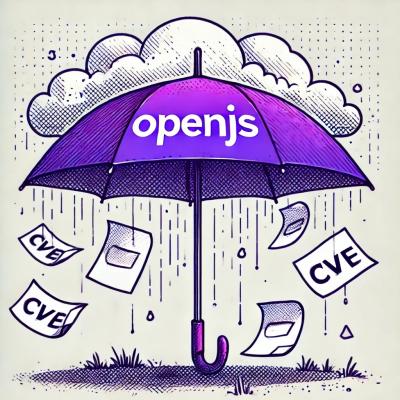
Research
Security News
Malicious npm Package Wipes Codebases with Remote Trigger
A malicious npm typosquat uses remote commands to silently delete entire project directories after a single mistyped install.
feathers-openai
Advanced tools
NOTE: This library is new and APIs may change as features stablize.
This library enables a series of FeathersJS services that map to the entities and routes of the OpenAI API.
By wrapping the API in a set of FeathersJS services, developers can quickly integrate any subset of the OpenAI API into their FeathersJS application. This enables the developer to log, manipulate, wrap hooks around, and make direct or indirect calls to the API.
Exposing OpenAI within a secure enterprise environment comes with inherent risk, given the likely high volume of text data that leaves your system. By consolidating OpenAI behind a Feathers service, we can get the benefits of both a secure proxy and the control that comes with individualized authentication and query filtering. Feathers-openai can be both a quick way to integrate OpenAI into an application as well as a quick way to scale an enterprise gateway to the OpenAI API with all of the benefits of FeathersJS baked in (Auth mgmt, API key mgmt, custom mutations and resolvers, etc.)
openai/embeddings)openai/fine-tunes/:id/cancel)/my-openai-prefix/models)multercreate calls.This library and the services included are tested against REST APIs for Feathers v5. The examples below demonstrate the use of uploads for KoaJS only, though Express is probably very similar.
Additional testing and PRs are welcome.
| feathers | v5 | v4 | v3 |
|---|---|---|---|
| express | :white_check_mark: | :grey_question: | :grey_question: |
| koa | :white_check_mark: | :grey_question: | :grey_question: |
| primus | :grey_question: | :grey_question: | :grey_question: |
| socket.io | :grey_question: | :grey_question: | :grey_question: |
NOTE: PRs are welcome!
To install the services, add the library as a dependency.
npm install --save feathers-openai multer @koa/multer
In your app.js file, add the following middleware calls:
import koamulter from '@koa/multer';
import { openaiMulter, openai } from 'feathers-openai';
app.use(koamulter().any());
app.use(openaiMulter);
The koamulter captures multi-part form uploads to your endpoints. The openaiMulter appends the file(s) to the ctx.feathers object, making the buffers accessible within the hook and service params. The multer library or equivalent is required by koamulter.
In your src/services/index.js add the following:
import { openai } from 'feathers-openai'
export const services = (app) => {
app.configure(openai('openai'))
// ... other services
}
API Key in [env].json
You must add your API key in your /config/[env].json file.
{
"openai":"sk-XXXXXXXXXXXXXXXXXXXXXX"
}
Service Options:
prefix (optional, default: openai) - The prefix added to every OpenAI service route. This allows you to nest the services so that their common names (i.e. model, etc.) don't overwrite your core application services. The default setting will result in routes like openai/models and openai/fine-tunes.allowedEntities (optional, default: all). This option allows you to disable and prevent the loading of any of the OpenAI API routes and entities. It takes an array of entity names. For example, setting allowedEntities=['models'] would enable only the openai/models service. This list of services are:
modelseditscompletionsimages/generationsimages/editsimages/variationsfine-tunesembeddingsmoderationsfilesThe services come with no hooks by default. You can add hooks by simply setting the hooks property after app.configure. For example:
export const services = (app) => {
app.configure(openai('openai'))
attachOpenAIhooks(app)
// ... other services
}
function attachOpenAIhooks(app){
app.service('openai/models).hooks({
before:{
all:[()=>console.log('in the models hook!')]
}
})
}
You can also directly leverage the service as part of another service flow, like using the AI to write a title for an article.
app.service('articles').hooks({
before:{ create:[
(ctx)=>{
let text = ctx.data.text;
ctx.data.title = ctx.app.service('openai/completions)
.create({
model: "text-davinci-003",
prompt: `Write a clickbait title for the following text:\n${text}\n####`,
max_tokens: 7,
temperature: 0,
stop:'###'
}).then(r=>r.choices[0].text)
}]
}
})
Adapter Syntax: feathers-openai does NOT implement the Feathers Common database adapter API
Pagination: The current OpenAI API does not demonstrate how they will provide pagination for large responses, so for find method calls, the total, $limit and $skip are server-side manipulations of the OpenAI response and will not reduce the call on the OpenAI side. Any calls to find will return the standard feathers object { total:x ... data:[...]} but create , get, remove,update will return as close to the original OpenAI response.
Queries/Search: There is NO query capability for the OpenAI API so it is not implemented here. This library does not implement the FeathersJS querying syntax.
FAQs
An open.ai adapter for FeathersJS
The npm package feathers-openai receives a total of 11 weekly downloads. As such, feathers-openai popularity was classified as not popular.
We found that feathers-openai demonstrated a not healthy version release cadence and project activity because the last version was released a year ago. It has 1 open source maintainer collaborating on the project.
Did you know?

Socket for GitHub automatically highlights issues in each pull request and monitors the health of all your open source dependencies. Discover the contents of your packages and block harmful activity before you install or update your dependencies.

Research
Security News
A malicious npm typosquat uses remote commands to silently delete entire project directories after a single mistyped install.

Research
Security News
Malicious PyPI package semantic-types steals Solana private keys via transitive dependency installs using monkey patching and blockchain exfiltration.

Security News
New CNA status enables OpenJS Foundation to assign CVEs for security vulnerabilities in projects like ESLint, Fastify, Electron, and others, while leaving disclosure responsibility with individual maintainers.